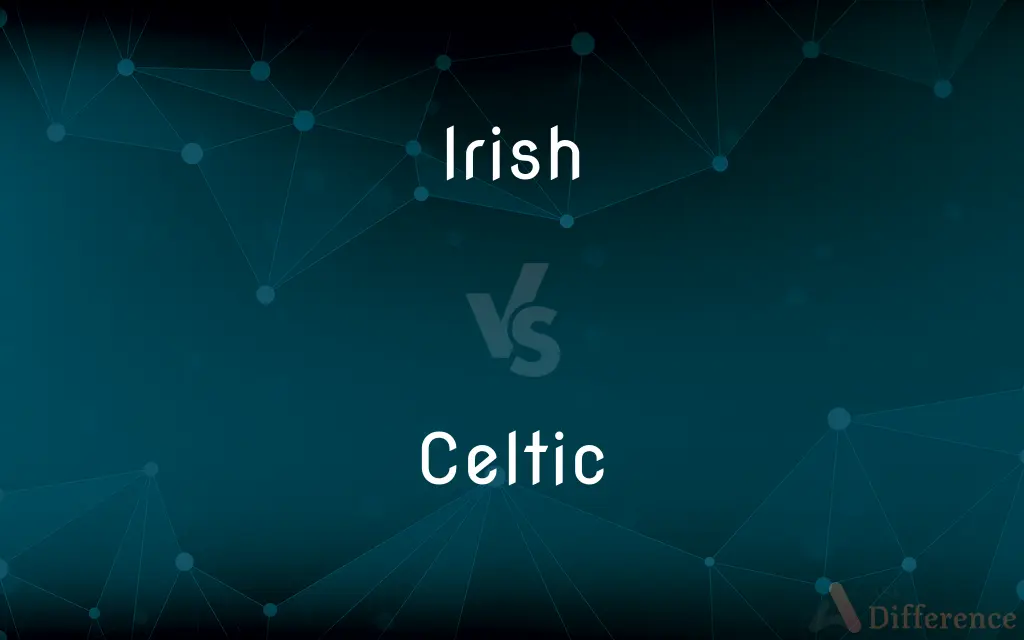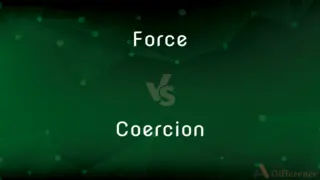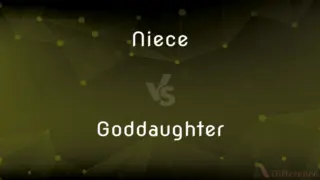Irish vs. Celtic — What's the Difference?
Edited by Tayyaba Rehman — By Maham Liaqat — Updated on March 28, 2024
Irish pertains specifically to Ireland, its culture, people, and language, while Celtic refers to a wider group of ancient peoples across Europe and their modern descendants, encompassing various cultures including the Irish.

Difference Between Irish and Celtic
Table of Contents
ADVERTISEMENT
Key Differences
Irish culture, language, and heritage are specific to Ireland, embodying its unique history, traditions, and Gaelic language. It represents one of the modern identities that have evolved from ancient Celtic civilization. On the other hand, Celtic refers to the broader cultural, linguistic, and historical group originating from Iron Age Europe, spreading across what is now known as Ireland, Scotland, Wales, Brittany, Cornwall, and the Isle of Man, each developing distinct yet interrelated cultures, languages, and traditions.
While Irish traditions, music, dance, and mythology are celebrated aspects of Ireland's national identity, Celtic culture encompasses a wider array of traditions and languages across several regions, not limited to but including the Irish. For example, both Irish and Scottish cultures share Celtic roots, but each has developed unique expressions of music, language, and social customs.
The Irish language, also known as Gaelic, is a specific branch of the Celtic languages, which also include Scottish Gaelic, Welsh, Breton, Cornish, and Manx. Each Celtic language has evolved differently, reflecting the diverse histories and interactions of their speakers.
In the context of modern identity and heritage, being Irish means being from Ireland or of Irish descent, with specific cultural markers such as the celebration of St. Patrick's Day, traditional Irish music, and Gaelic sports. Celtic identity, however, might be embraced by people from any of the Celtic nations, celebrating the broader shared heritage of Celtic art, mythology, and historical achievements.
Understanding the distinction between Irish and Celtic is crucial for appreciating the specificities of Ireland's cultural identity within the broader, diverse tapestry of Celtic history and heritage, recognizing the unique contributions and characteristics of each Celtic nation.
ADVERTISEMENT
Comparison Chart
Geographical Origin
Specific to Ireland.
Refers to regions across Europe, including Ireland.
Culture and Traditions
Unique to Ireland, including Gaelic language, music, and folklore.
Encompasses a variety of cultures, including but not limited to Irish.
Language
Irish Gaelic.
Includes several languages: Irish Gaelic, Scottish Gaelic, Welsh, Breton, Cornish, and Manx.
Modern Identity
Relates to people from or descended from Ireland.
Can refer to anyone from the Celtic nations, embracing a shared heritage.
Historical Context
Part of the Celtic group but with a distinct history and evolution.
Ancient peoples spreading across Europe, with diverse yet interconnected histories.
Compare with Definitions
Irish
Pertaining to Ireland or its people.
Irish music often features the fiddle and tin whistle.
Celtic
Relating to cultures of the ancient Celts.
Celtic art is renowned for its intricate patterns.
Irish
Rich in folklore and mythology.
Irish mythology includes tales of leprechauns and the Tuatha Dé Danann.
Celtic
Encompasses several languages.
The Celtic languages include Welsh and Breton.
Irish
Gaelic language of Ireland.
She speaks fluent Irish, learned from her family in Galway.
Celtic
Broad historical influence.
Celtic tribes once inhabited much of Europe.
Irish
Known for unique sports.
Gaelic football is a popular Irish sport.
Celtic
Shared heritage among Celtic nations.
The Celtic Connections festival celebrates music from all Celtic regions.
Irish
Celebrated through St. Patrick's Day.
St. Patrick's Day parades showcase Irish culture worldwide.
Celtic
Diverse yet interconnected traditions.
Celtic music varies across regions but shares common themes.
Irish
Of or relating to Ireland or its people, language, or culture.
Celtic
A subfamily of the Indo-European language family comprising the Insular and the Continental branches.
Irish
The people of Ireland.
Celtic
Of or relating to the Celts or their languages.
Irish
People of Irish ancestry.
Celtic
Of or pertaining to the Celts; as, Celtic people, tribes, literature, tongue.
Irish
The Goidelic language of Ireland. Also called Irish Gaelic.
Celtic
The language of the Celts.
Irish
See Irish English.
Celtic
A branch of the Indo-European languages that (judging from inscriptions and place names) was spread widely over Europe in the pre-Christian era
Irish
(Informal) Fieriness of temper or passion; high spirit.
Celtic
Relating to or characteristic of the Celts
Irish
Of or pertaining to Ireland or to its inhabitants; produced in Ireland.
Irish
The natives or inhabitants of Ireland, esp. the Celtic natives or their descendants.
Irish
The language of the Irish; also called Irish Gaelic or the Hiberno-Celtic.
Irish
An old game resembling backgammon.
Irish
People of Ireland or of Irish extraction
Irish
Whiskey made in Ireland chiefly from barley
Irish
The Celtic language of Ireland
Irish
Of or relating to or characteristic of Ireland or its people
Common Curiosities
What is the significance of Celtic art and symbols?
Celtic art and symbols, such as the triskelion or Celtic knots, represent aspects of their spiritual beliefs and interconnectedness of life.
How did Celtic languages evolve?
Celtic languages evolved from a common ancestral language, diversifying as Celts migrated and settled in different regions.
Are all Celts Irish?
No, Celts include people from Ireland, Scotland, Wales, Brittany, Cornwall, and the Isle of Man, each with their own cultures.
What makes Irish culture unique within the Celtic group?
Irish culture has distinct traditions, language, and history, particularly its Gaelic language, folklore, and music.
Can someone be Celtic but not Irish?
Yes, individuals from any of the Celtic nations can identify as Celtic without being Irish.
How do Celtic nations collaborate or celebrate their shared heritage?
Through festivals, cultural exchanges, and academic studies, Celtic nations explore and celebrate their common roots and diversity.
What role does mythology play in Celtic cultures?
Mythology is central, providing insight into the beliefs, values, and imagination of the ancient Celts and their modern descendants.
Is the Gaelic language the same in Ireland and Scotland?
No, while both are Celtic languages, Irish Gaelic and Scottish Gaelic have evolved differently and are distinct languages.
Why is St. Patrick's Day specifically Irish?
It celebrates St. Patrick, a patron saint of Ireland, and has become a global symbol of Irish culture and heritage.
How do Irish and Celtic identities intersect in modern times?
Irish identity is a specific national identity, while Celtic identity may encompass a broader appreciation for the shared heritage of the Celtic nations.
How are Celtic languages preserved today?
Through education, media, and cultural initiatives, efforts are made to preserve and revitalize Celtic languages.
What distinguishes Celtic spirituality?
Celtic spirituality often emphasizes the connection with nature, the ancestral world, and the cycle of life.
What are some common features across Celtic music?
Despite regional variations, Celtic music often shares characteristics like the use of specific instruments and modal melodies.
Can Celtic traditions be found outside of Europe?
Yes, due to diaspora, Celtic traditions have influenced cultures in the Americas, Australia, and beyond.
What impact did the Celts have on European history?
The Celts significantly influenced the cultural, linguistic, and historical landscape of Europe, leaving a lasting legacy.
Share Your Discovery

Previous Comparison
Force vs. Coercion
Next Comparison
Niece vs. GoddaughterAuthor Spotlight
Written by
Maham LiaqatEdited by
Tayyaba RehmanTayyaba Rehman is a distinguished writer, currently serving as a primary contributor to askdifference.com. As a researcher in semantics and etymology, Tayyaba's passion for the complexity of languages and their distinctions has found a perfect home on the platform. Tayyaba delves into the intricacies of language, distinguishing between commonly confused words and phrases, thereby providing clarity for readers worldwide.














































